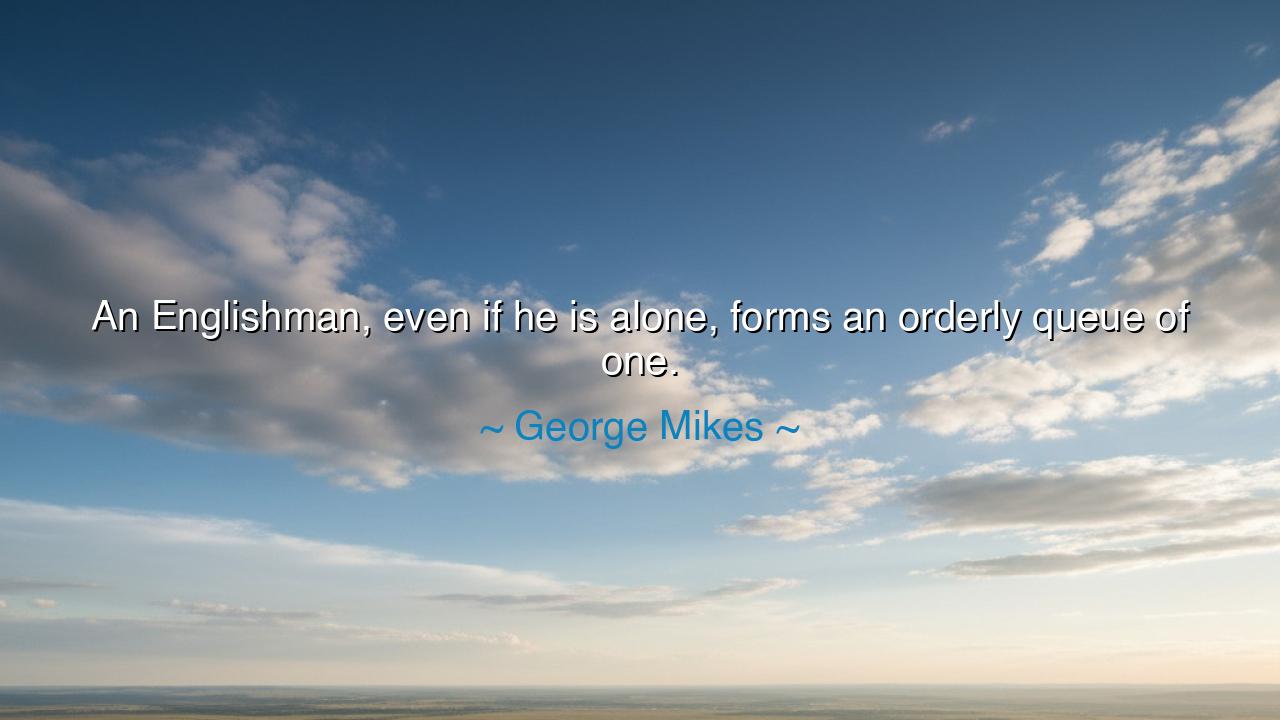
An Englishman, even if he is alone, forms an orderly queue of






“An Englishman, even if he is alone, forms an orderly queue of one.” — thus wrote George Mikes, the Hungarian-born humorist who, upon coming to England, observed its people with both affection and astonishment. In this lighthearted phrase lies more than jest; there is philosophy wrapped in laughter, a portrait of a nation’s soul painted with wit and truth. To the untrained ear, it sounds like a mere joke about manners; but to the contemplative heart, it is a revelation about order, discipline, dignity, and self-restraint — the virtues that bind a people even when no eyes are upon them.
The origin of this quote springs from Mikes’s famous book How to Be an Alien (1946), a work that captured with warmth and irony the peculiar habits of the English. As an immigrant, he saw what the native-born could not — the beauty in their restraint, the quiet heroism of their politeness. The Englishman, he observed, does not need an audience to behave properly; his manners are not performance, but principle. Even when alone, he keeps to the invisible rules of civilization, forming, as Mikes said, “an orderly queue of one.” It is a statement that mocks lightly but honors deeply, for it celebrates the inward discipline that keeps chaos at bay.
The queue, in the culture of England, is no small thing — it is a symbol of fairness, patience, and respect. To queue is to acknowledge that every person, no matter how high or low, has a place and a turn. It is the embodiment of democracy in its simplest form. The English queue not because they must, but because order is sacred to them; they believe that the dignity of all depends upon the restraint of each. Thus, even if no one stands behind or before them, they imagine the invisible company of others and hold their place. This habit, so easily mocked, is in truth a quiet act of self-governance, a reflection of the moral backbone that built an empire — and, perhaps more importantly, sustained it through decline.
History itself offers proof of this character. When London burned during the Blitz, when bombs fell and the earth trembled, the people queued calmly for buses amid the ruins. There were no riots, no pushing crowds, no collapse of spirit. The order of their lines mirrored the order of their hearts. Even in darkness, they held fast to the rituals that gave them identity. It was not the might of weapons alone that preserved them, but this strange, serene discipline — the ability to remain human when the world seemed to fall apart. In those days, to queue was to declare: “We are still a people. We shall not yield to chaos.”
Beneath Mikes’s humor lies a universal truth: civilization begins where self-restraint is stronger than impulse. The man who can stand patiently, even when no one watches, has conquered himself. He acts rightly not for reward, but because rightness has become his nature. This is the essence of maturity, of morality, of the inner law that no external force can compel. The queue of one thus becomes a metaphor for integrity — the silent alignment of the self with order, reason, and respect.
And yet, there is tenderness in this discipline. To form a queue, even when alone, is to imagine others — to feel one’s belonging to a greater whole. It is an act of empathy, a quiet acknowledgment that life is shared, that space and time must be divided with grace. The Englishman in Mikes’s tale is not a cold creature of habit, but a soul who honors the unseen presence of his fellow men. In his waiting, he affirms community. In his restraint, he practices kindness.
The lesson, then, is not only for the English, but for all who seek to live wisely in a crowded world. Let us each become a “queue of one” — disciplined when alone, courteous when unseen, orderly in the face of chaos. Let us honor the invisible rules that protect the dignity of all: patience, fairness, and respect. In an age that celebrates haste and noise, the quiet virtue of the queue becomes an act of rebellion — a stand for grace amid disorder.
So remember the wisdom behind George Mikes’s laughter: that civilization begins not in the palace or the parliament, but in the heart of the ordinary person who chooses restraint over selfishness, order over impulse, and respect over dominance. To form an orderly queue of one, even in solitude, is to live as though the world still matters — as though the invisible thread of decency still binds us together. And if we can hold to that, even in small things, then perhaps, like the Englishman in Mikes’s tale, we too will stand steady when the world begins to shake.






AAdministratorAdministrator
Welcome, honored guests. Please leave a comment, we will respond soon